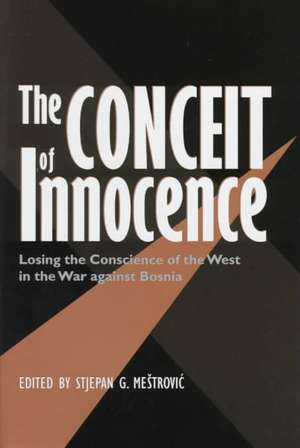The Conceit of Innocence: Losing the Conscience of the West in the War Against Bosnia: Eastern European Studies (Hardcover), cartea 4
Autor Mestrovic Editat de Stjepan G. Mestrovic, Stjepan G. Metrovicen Limba Engleză Hardback – 30 sep 1997
In his introduction to "The Conceit of Innocence," Stjepan Mestrovic shows how the theory of imitation--or conceit--flows out of Reisman's and his own previous works and acts as the theme that binds the essays of the contributing authors.
Renowned anthropologist Akbar Ahmed discusses the existence of "ethnic cleansing" in the face of Western assertions that ethnic-based hatreds largely have been overcome. In his two essays, Richard Johnson shows the hypocrisy in the U.S. State Department's reaction to the genocide in Bosnia and demonstrates how the West--even as it pretends to expand NATO and enforce security and democratic principles--has begun to appease Russian expansionism as it had appeased Serbian aggression. Syndicated columnist Georgie Anne Geyer furthers this theme by exposing how the White House, the UN secretary-general, and a host of others pretend to follow resolutely the UN Charter while at the same time appeasing genocidal aggression.
Keith Doubt reveals how the West attempts to "save face" and "give face" to Slobodan Milosevic, the man widely held to be responsible for starting the Bosnian War. Slaven Letica further unveils hypocrisy in examining the many international war criminals who have been lionized in the West. Brad Blitz finds Western universities to be dangerously duplicitous in their response to a moral crisis. Albert Wohlstetter removes the mask of Lincoln, placed on Boris Yeltsin by Western opinion makers, to reveal true Russian foreign policy motives. Chandler Rosenberger exposes the false innocence of Serbian mythology. And finally, Stephen W. Walker and Marshall Freeman Harris, the two former State Department officials who resigned their posts in protest over the Clinton administration's handling of Bosnia, dissect the U.S. peace plan, concluding that what pretends to be American moral leadership really follows in the wake of European appeasement.
Interpreting the 1990s sociopolitical text crafted by spin and driven by hidden motive, these essays are at the vanguard of a cultural theory that is responding to the here and now. Sociologists, historians, and other interested in the Bosnian War and its global ramifications will find this book to be an invaluable contribution to a growing literature.
Preț: 271.72 lei
Preț vechi: 307.94 lei
-12% Nou
Puncte Express: 408
Preț estimativ în valută:
51.100€ • 53.96$ • 43.46£
51.100€ • 53.96$ • 43.46£
Carte indisponibilă temporar
Doresc să fiu notificat când acest titlu va fi disponibil:
Se trimite...
Preluare comenzi: 021 569.72.76
Specificații
ISBN-13: 9780890967706
ISBN-10: 0890967709
Pagini: 256
Dimensiuni: 160 x 237 x 26 mm
Greutate: 0.6 kg
Ediția:New.
Editura: Texas A&M University Press
Seria Eastern European Studies (Hardcover)
ISBN-10: 0890967709
Pagini: 256
Dimensiuni: 160 x 237 x 26 mm
Greutate: 0.6 kg
Ediția:New.
Editura: Texas A&M University Press
Seria Eastern European Studies (Hardcover)
Notă biografică
Descriere
Innocence may be lost in the post-Cold War West with regard to democratic reform in Eastern Europe, but the practice of a "conceit" of innocence--or imitation of a purity of action commonly associated with the 1950s--is the theme explored in this unusual collection of essays contributed by a number of varied professionals, ranging from sociologist, anthropologist, journalist, political scientist, and other fields.






